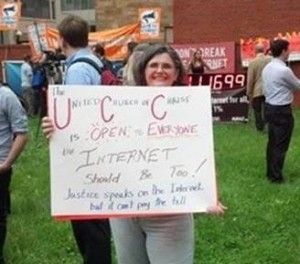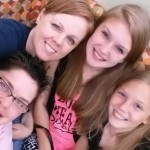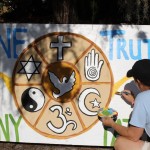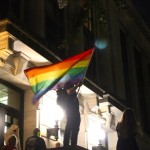I am so grateful to Kimberly for offering a chance to guest blog here. As I am sure many of you do, I admire Kimberly’s writing so much — she brings the real struggle that we all experience to life in her posts — giving me energy to face my own struggles. I work for the UCC’s media justice ministry, and for me Kimberly’s work is such a great example of how the online world is as much a real community as any community I have in person. Today is a great day for me to post because this week is an important week for the Internet – the Federal Communications Commission is voting on the future of the Internet this week, and we expect Congress to get involved right after.
Through the Internet, many people find community with other people who believe the same things they do, validation at times when we’re in desperate need of support. We can find God in the electrons when we come together looking for human connection. Kimberly’s example is one of the important reasons why the UCC’s media justice ministry, OC Inc., has placed such a high priority on fighting for net neutrality, and why we co-founded Faithful Internet. The Internet creates human connection in miraculous ways that were not possible only a few years ago, and I firmly believe that as we move into more and more online spaces that mimic close interpersonal connections, more and more people will find meaning and relationships with each other and their faith communities.
Great examples abound. I know Kimberly started some of her online ministry insecond life, and I was just enjoying a great blog post interviewing Becca Kelstrom, who is a real life pastor, but also helps run a UCC church in second life today about how she welcomes and offers support to visitors in second life. And in the last year the United Church of Christ created Extravagance UCC, an online congregation, designed to reach people that don’t attend a traditional church.
One of the driving reasons behind Extravagance is the UCC’s deeply held belief that we want to welcome all people to our community — Jesus taught to welcome everyone — and the UCC has been a leader in demonstrating we believe that the LGBTQ community is as welcome and blessed in God’s eyes as anyone. And yet, many people who we hope could find a home with us may have had many bad experiences in brick and mortar churches in the past. Perhaps, an online community could be a door that would be easier to enter for someone with years of hurt and anxiety about his or her sexual orientation and religion.
But to create a truly intimate and connected online space –where people can meet each other and the technology falls away, where the connection between people supersedes the technology used to connect–we’re going to need to use the most modern platforms. Today, participants connect in Extravagance using zoom online video chats. As it expands, it is my dream Extravagance will connect using more and more advanced video and high-intensity technology.
As a church venturing down this path, that a few others have trod successfully ahead of us–folks like Darkwood Brew and the Unitarian’s Church of the Larger Fellowship, the UCC is marshalling all of our scarce resources to develop worship, master technology, find the people who would find meaning and friendship in our community. While we know we have to compete with the myriad other things in people’s lives, from their busy schedules to their fears to the doubts, so far, however, we’ve been able to rest assured that if someone wants to join us on Sunday nights for online video bible study–they can as long as they have a computer and a broadband connection.
Like so many efforts at building community, we are reliant on the world around us, structures and decisions beyond our own efforts can put in front of us impenetrable walls. As so many Christians who are called to social justice–who look beyond the immediate needs of today to the structural barriers that result in inequity, poverty, fear, isolation. In our case, we’re reliant on an Internet that treats everyone equally — if someone wants to view our video feed, they can. Content from NBC or Amazon or Netflix rides on the same wires and is treated the same way as Extravagance Bible study. But as some of you have heard in this space before, technology policy is invading our utopian dream of an online space where all can meet as equals communing with each other and God. Because there is a danger that, in Washington DC, the law of the land could explicitly permit the big content folks to pay to be at the front of the line on the Internet.
Imagine, someone who is fearful, they haven’t been to church in years despite feeling the call to participate in a worship community, they think, “Well, maybe these Extravagance people could be OK, I’ll check them out.” The time for a service arrives, they log in, and — that little buffering circle of death is all they see. She’s waiting, and while waiting she starts to surf around on her phone — hey,Transparent comes through right away! “I can watch that show right now, and I’m already 10 minutes late for worship — I don’t want to start in the middle, maybe I’ll connect with God another day.” Or maybe that person does connect, but at the critical moment in the sermon, or a soaring sacred song–the spinning wheel pops up.
The moment is gone, community falls away and we’re left with a blank screen. Imagine that happening, not once in a while– but Every. Single. Time. Why? Because the big companies have deep pockets and they can pay big bucks to send their content faster, right away. The rest of us have to wait. God is lost to buffering.
 Maybe you’ve never heard of “net neutrality” or maybe it’s old news. But net neutrality is the nick-name for a policy that will stop my nightmare scenario and protect all Internet content — make sure that everyone is treated fairly online. Net neutrality might sound like a far-away issue for nerds and big companies. But it’s not, and it’s not even only a concern for those of us creating faith communities online. The Internet is essential these days, whether it is a web site telling people when service starts on Sunday or a Mosque letting people know that a neighbor is ill and needs a hand, whether it’s a pastor demonstrating the vitality and humanity of young African Americans in her neighborhood in response to Ferguson, or Birth Justice doulas helping women deliver babies in prison. Research shows that increasing load times by as little as 100 millisecondssignificantly reduces the amount of time people spend on a site. A small delay means a big problem.
Maybe you’ve never heard of “net neutrality” or maybe it’s old news. But net neutrality is the nick-name for a policy that will stop my nightmare scenario and protect all Internet content — make sure that everyone is treated fairly online. Net neutrality might sound like a far-away issue for nerds and big companies. But it’s not, and it’s not even only a concern for those of us creating faith communities online. The Internet is essential these days, whether it is a web site telling people when service starts on Sunday or a Mosque letting people know that a neighbor is ill and needs a hand, whether it’s a pastor demonstrating the vitality and humanity of young African Americans in her neighborhood in response to Ferguson, or Birth Justice doulas helping women deliver babies in prison. Research shows that increasing load times by as little as 100 millisecondssignificantly reduces the amount of time people spend on a site. A small delay means a big problem.
This is why I’m so proud of our work to demonstrate the importance of net neutrality to everyone and to work for the UCC’s media justice ministry and ourFaithful Internet project. I’m so grateful Kimberly let me share this story today, and for her earlier blog on this topic. At Faithful Internet we’re sponsoring aGroundswell petition and collecting testimonials of the many ways that the faith community uses the Internet, from online justice actions to sermons via podcast, from connecting with our pastors to talking with teens.
Please, visit Faithful Internet to explain how you use the Internet — perhaps you read blogs on Patheos?– so that our leaders in Congress know that all of us are counting on full, real, net neutrality. The FCC adopted great rules today, but the newly conservative Congress is already making plans to block it. Our political leaders need to know that this will affect all of us.
Cheryl Leanza is the policy advisor for the United Church of Christ’s media justice ministry, UCC OC Inc. You can follow the Faithful Internet campaign at: https://www.facebook.com/












